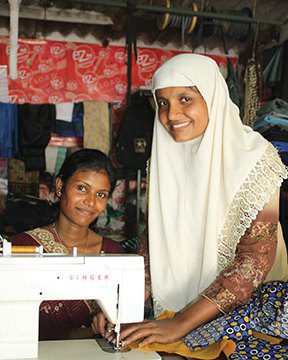
Accenture is sharing its employees’ and nonprofit partners’ talents to combat global unemployment — particularly of youth — through its Skills to Succeed initiative.
by Katie Kuehner-Hebert
September 3, 2014
Accenture and the Accenture Foundation have donated more than $150 million in cash as well as pro bono contributions of time and employee skills to support Skills to Succeed, an initiative to help people around the world build the skills necessary to gain employment or start their own businesses. The results also benefit Accenture’s talent pipeline, as well as pipelines for its clients and other organizations, ultimately boosting future economic opportunities for all.
Since Skills to Succeed was launched in 2009, the training, coaching and mentoring initiative has equipped more than half a million people with the skills to get a job or build a business — more than twice the original goal Accenture set in 2010. The global management consulting, technology and outsourcing firm’s new goal is to increase that number to 700,000 people around the world by 2015.
It’s All About Metrics
Skills to Succeed was born from a desire to help demonstrate in a measurable and tangible way the effect a firm’s corporate citizenship activities can have globally, said Jill Huntley, Accenture’s managing director of global corporate citizenship, who is based in London. The desire to build skills to increase employment and entrepreneurship became a focus for learning because it reflected the company’s values. 
“Skills to Succeed identified a strong resonance around developing talent, and building and matching skills in the marketplace,” Huntley said. “It still resonates today as we see rising unemployment, particularly among young people.”
Accenture employees volunteer for activities such as information technology skills workshops, creating new technology programs for skills training, implementing new technology platforms and mentoring entrepreneurs. In 2012, the firm introduced a global online volunteering platform, myCorporateCitizenship, to make it easier for employees to contribute to Skills to Succeed and other initiatives.
Employees also work with nonprofits and other organizational partners that have like-minded goals concerning employment and entrepreneurs. For instance, Youth Business International, based in London, provides a network of roughly 40 local organizations around the world with funding, mentoring and training tools to help disadvantaged young people become successful business entrepreneurs.
“That’s where Skills to Succeed plays a role,” said Maarten Rooney, Youth Business International’s chief operating officer. “Most member organizations focus on financial support, but Accenture also helps us in developing coaching, training and mentoring support.”
The nonprofit has been able to help nearly 45,000 young entrepreneurs through Accenture and Accenture Foundation’s support of more than $10 million in cash and pro bono employee time and contributions, he said. The goal is to extend that to an additional 30,000 people by 2015, and to 100,000 by 2020.
Other Skills to Succeed partners include U.K.-based Plan International, which provides underprivileged young people, particularly rural migrants and girls, with skills for jobs in information technology, customer relations, business processes, electronic repair and other industries.
Since starting the partnership in 2011 through the end of 2013, Accenture has committed more than $5.5 million to Plan International to support projects around the world, including providing training and career opportunities for roughly 3,500 underprivileged young people in India and Vietnam, and roughly 7,100 in Thailand and Indonesia.
Accenture also has been working with Westport, Connecticut-based Save the Children to create job skills training and placement opportunities for disadvantaged and at-risk young people globally. Overall, Accenture has committed more than $2.5 million to the organization’s programs, and trained more than 10,000 migrant young people in Shanghai and Beijing, and boosted employment opportunities for roughly 7,000 disadvantaged and at-risk young people — including nearly 5,000 young women — in Egypt, Indonesia and the Philippines.
During the next two years, Save the Children — with Accenture and its employee volunteers’ support — has set a goal to improve the employment prospects of more than 26,000 at-risk youth in Bangladesh, China and Vietnam.
Accenture also helps some of its nonprofit partners build their capabilities through pro bono consulting projects such as creating new technology programs for skills training, identifying new market or funding opportunities and streamlining internal processes.
For instance, the company helped Japan-based Makoto expand its capabilities to assist some of those most affected by the country’s 2011 earthquake. Together, Accenture and Makoto designed and implemented a new technology platform to manage training and mentoring programs and track access to capital to help build businesses started by Japanese young entrepreneurs.
Accenture also helps to maximize the effect of its partners’ local strategies through its market research tools, which can pinpoint vulnerable populations, high-growth job sectors and potential nonprofit partners.
Huntley said Accenture looks for partners that can measure program impact, but this criterion is not essential because the company will often coach and support partners on how to build out their management and measurement frameworks. “As a global company, it’s also important for us to make contributions to economies and societies where we operate,” she said. “Many of our partners have a global footprint but also strong local roots.”
Within the Skills to Succeed initiative, Accenture and its partners measure material changes in job readiness or entrepreneurial skill levels in each program to discern whether it has systematically moved individuals along the path to secure jobs or build businesses. The firm and its partners are also measuring the effectiveness of specific learning modalities within those programs, such as classroom workshops for information technology skills, e-learning programs with job-training modules and mentoring for entrepreneurs.
Accenture is particularly working with its partners to track outcomes beyond the skill-building stage, Huntley said. The organization and those it partners with seek to measure how the Skills to Succeed initiative is increasing individual competitiveness in the job market, building sustainable businesses, enhancing economic resiliency and creating employment opportunities for others.
For example, Skills to Succeed partner Fundación Pescar in Argentina found that 90 percent of the people who were trained in information technology software and programming found jobs with firms doing business there, including Accenture. In India, more than half of the 4,000 rural female entrepreneurs trained by Accenture’s partner, Entrepreneurship Development Institute, between 2010 and 2012 now have operational businesses.
In the U.S., Accenture has been working with the nonprofit Knowledge Is Power Program to expand a joint initiative, Future Focus, a college and career readiness program created by the two organizations. Accenture is using KIPP interns at some of its locations, including its Silicon Valley Technology Labs, where the interns had the chance to meet Pierre Nanterme, Accenture’s chairman and CEO.
When Things Get Tough
There have been a number of challenges in implementing Skills to Succeed, but Accenture and its partners are finding ways to mitigate them. One challenge has been how to work through cultural differences —Huntley said it’s the same challenge Accenture has had working across the nonprofit, public and private sectors in its business lines. From time to time, the firm’s volunteers and its Skills to Succeed partners have had to learn to speak each other’s languages to be successful.
However, it’s a challenge that is anticipated, as there’s usually a period of “forming, storming and norming to launch any project,” Huntley said. “We have to find ways to get to know each other better, to think with each other, so we can build strong relationships. We go on that journey together. Working across the world in many different countries is a challenge, but it’s one that we’ve embraced.”
Another challenge has been how to adequately address such a significant and pressing issue as rising global unemployment. Huntley said using technology has helped to accelerate and expand the Skills to Succeed initiative’s impact.
For example, Accenture worked with a software specialist and employability experts to launch the Skills to Succeed Academy. The online training modules it offers are geared for young people looking for jobs, and as such, utilize gaming techniques and simulations in bite-size segments to help them better learn practical and realistic employability skills. Accenture is now employing graduates of this program as apprentices to help further develop academy software.
In some cases, Skills to Succeed actively contributes to Accenture’s talent agenda. The firm has been able to bring the people who its volunteers and partners are helping within different programs into its workforce. “For example, young disadvantaged people, military veterans or those with disabilities that we have trained are able to access job opportunities that they would not otherwise,” Huntley said. “This loops back closely to the objectives of Skills to Succeed and demonstrates the far-reaching benefits of the program.”
The initiative also has been a powerful force for growth — both professionally and personally — for Accenture’s employees, whose participation in Skills to Succeed rose from 477,000 hours in 2012 to 518,000 in 2013.
“Working to help people with disabilities obtain training and become self-reliant has provided a great opportunity for me to broaden my own experiences and skills,” said Shinya Sato, an Accenture employee in Japan. “On top of this, the gratitude — hearing a simple thank you — from those we are helping gives me such a great sense of accomplishment and pleasure.”



